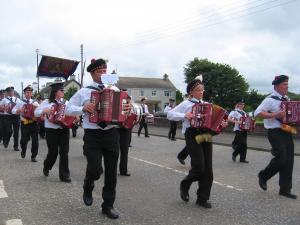
by Q Radio News
The Public Prosecution Service has decided not to prosecute three bandsmen for an alleged public order offence during an Apprentice Boys of Derry parade in August 2019.
The decisions centre on a police investigation into allegations that the three had worn shirts bearing Parachute Regiment and Soldier F emblems whilst parading through the centre of Londonderry.
The PPS had to consider whether the wearing of these shirts amounted to an offence of provocative conduct having regard to all the circumstances including the location of the parade, the findings of the Bloody Sunday Inquiry, and the pending prosecution of Soldier F for offences including murder.
Several requests for further information were made to police to ensure that all relevant evidence was obtained and properly taken into account.
The offence of provocative conduct has two limbs. The first arises where a person displays something, or does any act in any public place, with intent to provoke a breach of the peace.
The second arises where the conduct is likely to result in a breach of the peace or public disorder, whether or not there was any specific intent that it should do so.
PPS Assistant Director Martin Hardy said: “A Senior Public Prosecutor, assisted by advice from independent Senior Counsel, carefully considered all the available evidence and information reported on a police investigation file.
It was concluded that the Test for Prosecution was not met in respect of any offence for any of the three individuals on evidential grounds. “In respect of two of the three reported individuals, both of whom had worn the relevant shirts, it was concluded, following careful consideration of all the relevant facts and circumstances, that there was no reasonable prospect of conviction.
The considerations that informed that conclusion included the following:
- The context of the event, which was an annually held loyal order parade at which symbols of British military pageantry would be anticipated.
- The nature of and size of the emblems, which did not reference any unlawful organisation or carry any positive message of offence, and were small and visible only from close range.
- The fact that the shirts had been worn on previous occasions and the band lowered flags and proceeded by way of a single drum beat when passing an interface area.
- The absence of any clear evidential link between the conduct of the suspects and the public disorder that took place on the evening of the parade.
- The difficulty in proving any specific intent on the part of the reported individuals and the fact that, under the second limb of the offence, the prosecution is required to prove that violence (or threatened violence) was the likely effect of the suspects’ conduct.
Proof of a mere risk or possibility of a breach of the peace would not suffice.
“The third reported individual had worn a replica military uniform which did not bear any emblem relating to the Parachute Regiment or Soldier F.
"It was concluded that there was nothing worn, or done, by this individual in the course of the parade that provided any separate basis for prosecution.
"Furthermore, in light of the conclusions reached in relation to the first two reported individuals, the evidence did not provide a reasonable prospect of conviction on the basis that he encouraged or assisted an offence of provocative conduct by others.”
Mr Hardy added: “Although it was concluded that the wearing of the emblems did not provide a basis for prosecution, we recognise the sensitivities and concerns arising from the conduct of the Clyde Valley Flute Band in Derry on 10th August 2019.
"Those sensitivities and concerns were recognised by the band itself when it withdrew from a subsequent parade in December 2019.
"The decision not to prosecute is a judgment as to the likely prospects of proving an offence in the context of a criminal trial and should in no way be seen as diminishing the hurt that the conduct may have caused, not least to the victims and loved ones of those killed on Bloody Sunday.”


 Mother and two children murdered in Maguiresbridge to be buried together By Jonathan McCambridge and Rebecca Black, PA
Mother and two children murdered in Maguiresbridge to be buried together By Jonathan McCambridge and Rebecca Black, PA
 Surgeon tasked with tackling waiting lists says they are a ‘national shame’
Surgeon tasked with tackling waiting lists says they are a ‘national shame’
 First Minister disappointed to not attend Belfast Pride this year
First Minister disappointed to not attend Belfast Pride this year
 Crowds expected at vigil for mother and children killed in Co Fermanagh shooting
Crowds expected at vigil for mother and children killed in Co Fermanagh shooting